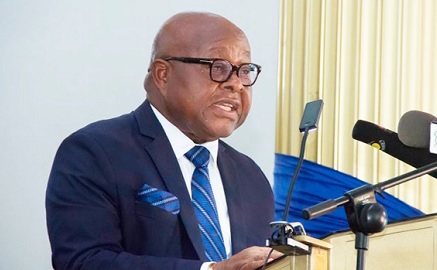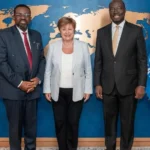ACCRA — Former Speaker of Parliament Professor Aaron Mike Oquaye has urged Ghana to fully exploit its abundant natural resources as a pathway to economic self-sufficiency, warning that failure to do so could lead to yet another bailout from the International Monetary Fund (IMF). Speaking at the launch of the Institute of Economic Affairs’ (IEA) seminar series on Ghana’s natural resources management regime, Oquaye emphasized the need for reforms to transform the country’s wealth in gold, cocoa, oil, and other assets into sustainable growth drivers.
The event, held on September 19, 2025, in Accra under the theme “Ghana Beyond the 17th IMF Bailout: Salvation in our natural resources?”, drew policymakers, economists, and civil society leaders to spark critical conversations on resource governance. Prof. Oquaye, a distinguished scholar and veteran politician, lamented Ghana’s recurring reliance on IMF support—marking the 18th program since independence in 1957—and called for a paradigm shift. “We must take full advantage of our natural resources to prevent the country from seeking yet another bailout from the IMF,” he said, highlighting how poor management has perpetuated cycles of debt and underdevelopment.
Ghana’s economy, Africa’s second-largest gold producer and the world’s second top cocoa exporter, has long grappled with boom-and-bust cycles tied to commodity prices. The discovery of offshore oil in 2007 promised prosperity, but revenues have been plagued by mismanagement, corruption scandals, and volatile global markets. Ghana secured its 17th IMF bailout in 2023 amid a severe debt crisis, with external obligations peaking at $30 billion and inflation soaring above 50%. Under President John Dramani Mahama‘s “Reset Ghana” agenda since January 2025, reforms have stabilized the economy: The Ghana cedi appreciated 21% against the U.S. dollar in the first nine months, inflation cooled to 11.5% in August, and GDP grew 6.3% in Q2, driven by services and agriculture. Yet, Prof. Oquaye warned that without bold steps in resource governance, these gains could evaporate, forcing another IMF lifeline.
Prof. Oquaye’s call echoes broader critiques of Ghana’s extractive sector. The IEA seminar series aims to address inefficiencies, such as the 5% royalty rate on gold—among Africa’s lowest—and environmental degradation from illegal mining (galamsey), which has polluted rivers and cost $500 million annually in water treatment. “Harnessing natural resources is key to ending IMF reliance,” Prof. Oquaye stressed, advocating for value addition, like local refining of bauxite and lithium, to boost jobs and revenues. Ghana’s lithium deposits, estimated at 1.8 million tons, remain largely untapped, while oil production from Jubilee Field hovers at 100,000 barrels daily, far below potential.
Experts at the launch, including IEA Senior Fellow Dr. John Kwakye, backed Prof. Oquaye’s vision, proposing a sovereign wealth fund overhaul and stricter transparency laws akin to Norway’s model.




